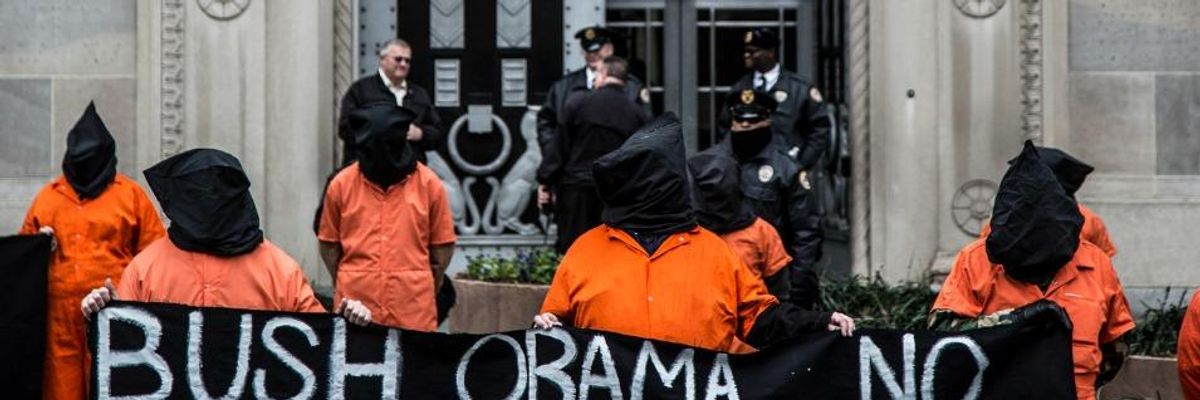In preparation for the much-anticipated release of the Senate's summary report on CIA torture, the head of one of the country's leading rights groups on Monday proposed a controversial solution to ensure that such crimes are never committed by the American government again: pardon President Bush and those who tortured.
Published in the New York Times op-ed pages, ACLU executive director Anthony Romero argues that an executive pardon by President Obama "may be the only way to establish, once and for all, that torture is illegal."
Romero, as head of one of the organizations that has lead the fight to disclose the United States' illegal torture campaign and demand accountability for those involved, acknowledges that prosecution of those responsible for the systemic abuses in the wake of the 9/11 terror attacks would be "preferable."
"But let's face it," Romero writes, "Mr. Obama is not inclined to pursue prosecutions -- no matter how great the outrage, at home or abroad, over the disclosures -- because of the political fallout."
Romero continues:
He should therefore take ownership of this decision. He should acknowledge that the country's most senior officials authorized conduct that violated fundamental laws, and compromised our standing in the world as well as our security. If the choice is between a tacit pardon and a formal one, a formal one is better. An explicit pardon would lay down a marker, signaling to those considering torture in the future that they could be prosecuted.
Mr. Obama could pardon George J. Tenet for authorizing torture at the C.I.A.'s black sites overseas, Donald H. Rumsfeld for authorizing the use of torture at the Guantanamo Bay prison, David S. Addington, John C. Yoo and Jay S. Bybee for crafting the legal cover for torture, and George W. Bush and Dick Cheney for overseeing it all.
Without such forthright action, Romero argues that Obama would leave open the possibility for government officials to "resurrect the torture policies in the future." Romero cites historic pre-emptive pardons as precedent for this action: Presidents Abraham Lincoln and Andrew Johnson's pardoning of Confederate soldiers; Gerald Ford's pardoning of Nixon after Watergate; and Jimmy Carter's pardoning of Vietnam War draft resisters.
"Pardons would make clear that crimes were committed; that the individuals who authorized and committed torture were indeed criminals; and that future architects and perpetrators of torture should beware," the op-ed concludes.
Published in advance of the Tuesday release of the executive summary of the Senate Intelligence Committee's report on CIA torture, Romero's proposal was met with immediate criticism by fellow rights advocates.
Baher Azmy, who as legal director of the Center for Constitutional Rights has represented numerous U.S. torture victims, wrote in response that a pardon for torture would compromise of our fundamental rights.
"The notion that torturers should be shielded from any consequences for their actions only makes sense in a society in which human rights and constitutional protections have been demoted - no longer our highest values, they are now repeatedly expendable whenever the specter of 'national security' is raised," Azmy said. "Reorienting our institutions toward accountability is a fundamental prerequisite to preventing future criminality."
Investigative journalist Marcy Wheeler argued that Obama would never do such a thing because he himself has "authorized war crimes," in the form of drone strikes, "using the very same Presidential Finding as the Bush Administration used to authorized torture."
And international law professor Kevin Jon Heller wrote that the "fatal flaw" in Romero's argument is that the Bush administration's torturers "will continue to believe that they did nothing wrong."
"No amount of evidence will pierce the veil of their self-delusion -- and no pardon will have any effect whatsoever on their own perceived righteousness," Heller writes.
Others shared their critiques online, arguing that such a move by the administration would be akin to a call for "amnesty" for war criminals.

